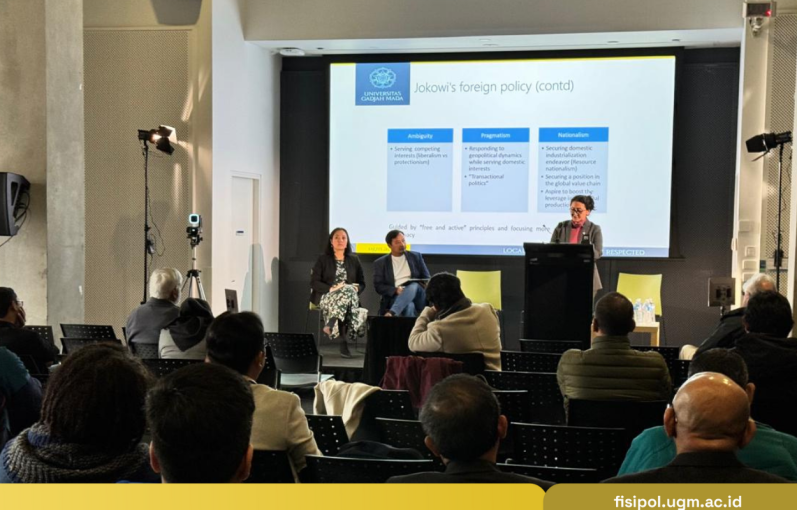
Australia, 25th July 2024–Fisipol UGM collaborated with the Faculty of Arts, the University of Melbourne in the fourth conference in the Australia-Indonesia in Conversation (AIC) series which was held in a hybrid manner in the Yasuko Hiraoka room, Sidney Myer Asia Center, the University of Melbourne, Australia on Thursday (25/07). The conference is designed to analyze and foster bilateral partnerships and share knowledge, experiences, and insights through interactive panel discussions involving diplomats, academics, and policymakers. The second panel with the theme “New Governments in Indonesia and Australia: Domestic Challenges, Global Regime Change, and Geopolitical Tensions” discussed how Australia and Indonesia are trying to respond to the latest domestic and global developments.
Poppy S. Winanti, Deputy Dean for Academic and Student Affairs, Faculty of Social and Political Sciences, UGM, who was also present as a speaker at the AIC conference, presented Indonesia post-2024 elections with President-elect Prabowo Subianto starting to map out how Indonesia’s foreign policy would work.
“Based on the campaign and several opportunities carried out, Prabowo tends to be the continuity of Jokowi’s government system,” explained Poppy.
Indonesia’s foreign policy, based on the free-active principle, will guide the President in carrying out Indonesian foreign policy. Although each government has a different approach and interpretation depending on the influence of global issues that occur. Poppy also added that there is a possibility that Indonesia has a stronger presence in international forums, which is one of Prabowo’s strengths compared to Jokowi.
Meanwhile, Randy W. Nandyatama, Lecturer in International Relations at Fisipol UGM, explained Indonesia’s relations in the regional arena, especially ASEAN. It is known that during Jokowi’s administration, Indonesia played the role of Chair of ASEAN in 2023. Randy highlighted ASEAN as a regional organization in the Southeast Asia region which is currently showing a weakening of ASEAN’s legitimacy both internally and externally.
“This was triggered by the tensions that occurred in Myanmar from the internal side and ASEAN’s relations with its Western allies from the external side,” explained Randy.
Randy also criticized the challenges faced by Indonesia and other ASEAN countries regarding the mentality of ASEAN members in dealing with regional issues, uncertainty in the prospects for AOIP outside of Indonesia’s leadership, and the lack of strategic encouragement in resolving problems. According to him, alternative solutions to face this challenge include embracing and normalizing minilateralism, avoiding divisions, and strengthening diplomatic leadership.
This conference is a manifestation of the Faculty of Social and Political Sciences UGM in supporting the 16th point of Sustainable Development Goals concerning Peace, Justice, and Strong Institutions, and the 17th point concerning Partnerships for the Goals.
